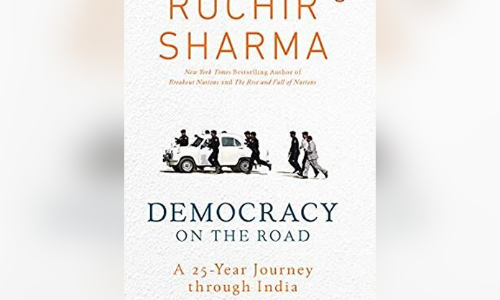Live
- ‘Thalapathi’ set for grand re-release on Rajinikanth’s 74th birthday
- Shahid Kapoor’s ‘Ashwatthama’ kept on hold due to budget constraints
- ‘Drinker Sai’ teaser: Attracts youth
- Netflix Outage in India and US Ahead of Tyson vs Paul Match
- Police Intensify Investigation into Lagacharla Attack on Officers; Eight More Detained
- Google Docs Introduces AI-Powered Clip Art Generator with Gemini
- LIC sets up stall at India Int’l Trade Fair
- Celebrating journalism and its role in society
- Supporting emotional well-being in children
- Govt plans 1 mn sq km oil exploration by 2030
Just In

The popularity graph of Prime Minister Narendra Modi has fallen drastically and what seemed a year ago as another wrestling match with only one boxer in the ring now seems a Lok Sabha election too close to call, says global investor and bestselling author Ruchir Sharma
The popularity graph of Prime Minister Narendra Modi has fallen drastically and what seemed a year ago as another wrestling match "with only one boxer in the ring" now seems a Lok Sabha election too close to call, says global investor and bestselling author Ruchir Sharma.
Sharma, who has been chasing election campaigns in India for over two decades and has just written "Democracy on the Road", says that this change reflects the strength of Indian democracy and is particularly significant at a time when obituaries calling the death of democracy rule the roost in many parts of the world.
This neck and neck fight at a time when there is so much despair about democracy in the world, Sharma said, shows how deeply rooted India's democratic set up is.
He said that Modi had begun eyeing the Prime Minister's post long before 2014 and following him closely during the election campaigns, Sharma could make out as early as 2012 what his real ambition was. On the other hand, Congress President Rahul Gandhi was a very different person, immature, not interested in listening, and with not-so-good campaigning skills.
Cut to the present, Sharma said, Rahul Gandhi has changed, he is much more sensitive, he seems to listen and engage more. "He seems like a full-time politician now, even his campaigning skills have changed, he implies shout-and-call technique a lot more like Modi. There has been a significant change in him," Sharma told IANS in an interview.
But what really is going to stop Modi? Sharma said that there is a gap between what prevails in popular media and the actual mood of the voters in the hinterland. He said the 2019 elections will be a true parliamentary election where regional leaders, instead of the prime ministerial candidate(s), will sway the votes.
"India is just not cut for a presidential election. There was a Modi wave in 2014 but even then it was restricted to the north and parts of the West but BJP's vote share was still only 31 per cent. The mood of the voters will vary from state to state as to what alliances are stitched up," he added.
He said that Priyanka Gandhi's entry is too late to make an appeal in Eastern UP. Describing her as a "charismatic leader" on the ground, Sharma maintained that her plunge is too late because of the caste blocks in Eastern UP. He, however, said that the greatest difference she can make is if she stands as "the combined Opposition candidate from Varanasi against Modi".
She has to do something as big as that because then the energy will be focussed in one big constituency that will have a larger impact, he said. According to Sharma, the biggest difference between the 2014 and the 2019 general elections will be that in 2014 the BJP was "far too ahead in the social media game" whereas now the other parties have caught up too and "the gap has narrowed".
He said that in a country as diverse and heterogeneous as India, it is very difficult for one leader to dominate a nationwide election. There is hardly any discussion about Rahul Gandhi or Modi in Tamil Nadu, it's always about the regional leaders. That's how our country is, it will not be easy for one centrist person to dominate the elections, he said.
(Saket Suman can be contacted at [email protected])

© 2024 Hyderabad Media House Limited/The Hans India. All rights reserved. Powered by hocalwire.com







